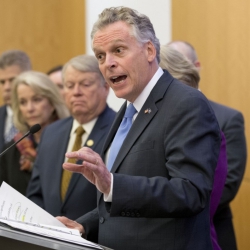
The Washington Post recently said the Virginia governor is learning “the art of making deals.”
Gov. Terry McAuliffe signed a fantasy sports bill which will make DraftKings and FanDuel legal in the Commonwealth of Virginia. The new law is the first in the country which explicitly states daily fantasy sports is legal and regulated, without making one-day fantasy contests sites admit they are a form of sports gambling.
Thus, Virginia becomes the first US state to have legalized and regulated daily fantasy sports.
The bill’s passage is a victory for fantasy sports operators like FanDuel and DraftKings. Both hope the Virginia law becomes a model for other states to pass similar regulations.
Brian Coy, Gov. Terry McAuliffe’s communications director, said the new bill will “empower Virginia to regulate this emerging industry and keep consumers safe from abuses.”
Law States DFS Is NOT Gambling
Not only does the bill give DFS sites the right to operate legally within Virginia. It also stipulates the daily fantasy sports is not gambling, which is a big win for the DFS operators. One reason they have not applied for gaming licenses in a state like Nevada is the fact the gaming officials there would force them to admit their games are a form of gambling.
Griffin Finan, the public affairs director for DraftKings, said of the new legislation, “We thank Gov. McAuliffe for his leadership and advocacy and are hopeful that other states across the country will follow Virginia’s lead.”
State Laws Are Key
Fantasy sports was given a carve-out in the Unlawful Internet Gambling Enforcement Act (UIGEA) of 2006. The UIGEA’s fantasy sports exemption was meant for yearly fantasy sports leagues, like the local fantasy football leagues and Rotisserie baseball leagues friends and family members participate in every year. In those contests, champions are determined over the course of an entire NFL or MLB season.
Within a couple of years of the passage of the UIGEA, businessmen decided there was a way to convert yearly fantasy sports into a one-day fantasy contest. The Scottish FanDuel operator launched in 2009 and began to sign up players on both sides of the AtlanticT. In 2011, DraftKings was launched.
Both companies, along with many other competitors, took advantage of the federal exemption for fantasy sports. In the United States, most gaming laws are enforced at the state level. That left the companies under the cloud of regulation or even bans, though the companies continued to grow their businesses.
Ad War Poisoned the Well
Eventually, the rivalry between FanDuel and DraftKings reached the open airwaves. After two rounds of investment in 2014 and 2015, the two companies began saturating the television, radio, and Internet broadcasts with advertisements. The companies no longer were flying under the radar.
When the Ethan Haskell scandal happened in October 2015, a number of state and federal officials began to reconsider their stance on DFS gaming. Nevada Gaming Control Board chairman A.G. Burnett declared DFS was a form of gambling and the companies needed to be licensed as gaming entities to continue to operate legally in Nevada.
State and Federal Officials Take Notice
Then a Tampa Bay area district attorney said he would investigate whether FanDuel and DraftKings were breaking Florida law. Then New York Attorney General Eric Schneiderman said DFS was gambling in New York State and the companies needed to cease-and-desist its activities in the state. Scheiderman was sued by both companies, and a key legal battle is set for May 2016 which will determine the results of Schneiderman’s anti-DFS campaign.
Eric Schneiderman said at the time, “Daily fantasy sports are creating the same public health and economic concerns as other forms of gambling.”
Attorneys General Ban DFS Gaming
Next, the attorney generals of Illinois and Texas said they felt daily fantasy sports was gambling. Thus, when Massachusetts and Virginia began to consider legalizing daily fantasy sports, DraftKings and FanDuel praised the regulators.
About Terry McAuliffe
Terry McAuliffe was the Chairman of the Democratic National Committee from 2001 to 2005. He was also the chairman of Bill Clinton’s reelection campaign in 1996. McAuliffe filled a similar role in 2008 for Hillary Clinton.
In 2009, the 59-year old Democrat made an unsuccessful run to be Virginia governor. He returned to win the 2013 election, winning over 47% against 45% of the vote went to his Republican rival, Ken Cuccinelli. Libertarian Robert Sarvis won over 6% of the vote, which gave the election to the Democrat in a state which has traditional gone for the Republicans.
Many Washington DC politicians and bureaucrats live in Northern Virginia, so the state has a larger liberal constituency than most southern states. In years when a moderate Democrat runs — such as former GOP politicians turned Democrat, Jim Webb — the Democrats have a legitimate shot at winning election to the governor’s job.
Terry McAuliffe has gained a reputation as a Democratic governor whom Republican lawmakers can do business with, a fact which has angered many progressives.
